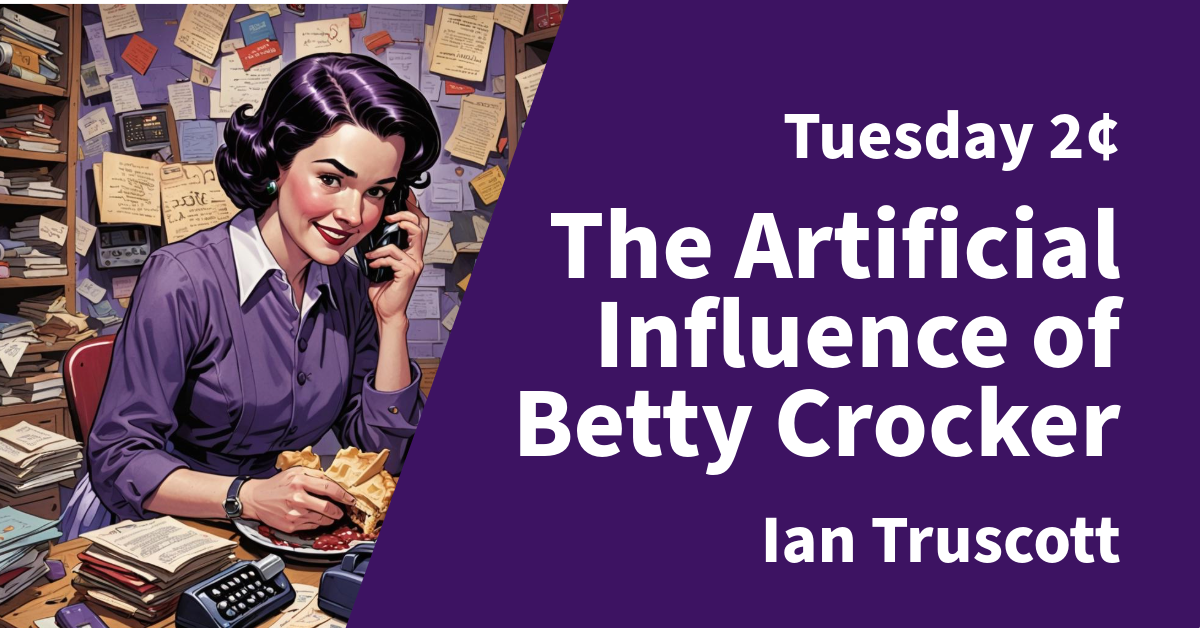Yes, this week, I was inspired by Betty Crocker’s story. I know, what’s that got to do with modern influencer marketing in an AI world? Well…
Right now, in advertising and marketing, we have our spidey senses turned up to 11 when it comes fakery, due to a healthy mass immune response to generative AI.
I regularly see images of claimed “outdoor activations” (or billboards to you and me) floating through my LinkedIn feed, lauded as brilliant for some creative or provocative idea before being quickly sussed out as fakes created by AI or Photoshop. Or sometimes sussed out as fakes and lauded as brilliant for how the image has gone viral.
There are also concerns about AI-generated influencers; some are benign and open about their AI’ness, and some are deep fakes out there to fool us.
But is creating a little bit of fiction around a brand bad?
I’m not sure where I picked it up from, but thinking about this, a while back, I made a note in my scratchpad of ideas for this random weekly thought: the story of Betty Crocker.
Who, spoiler alert, was not real.
You probably knew that.
Or maybe you didn’t, and perhaps, you haven’t heard of Betty Crocker and if this story travels….
Anyway…
Today, Betty Crocker is the name and face of a range of cake mixes and other baking goods.
However, initially, in 1921, in the US, she was the agony aunt of cooking.
Washburn-Crosby (now General Mills) ran a Gold Medal Flour promotion, which resulted in a flood of letters asking for advice about baking. Their response was to invent a fictitious chief of correspondence, whom they named “Betty Crocker.”
Then, like any decent influencer worth their baking powder, Betty diversified from direct mail correspondence about baking to the media channels of the day with a radio show in 1924 and TV in 1951 and, like the Insta-influencers of today, launched a range of products in 1941.
And, the measure of her influence?
Well, in 1945, Fortune magazine declared her “the second most popular woman in America”.
(You can read the full story on the PBS website)
I am not suggesting that the nefarious deeds that, no doubt, generative AI is being used for today are the same thing as this. I wasn’t around in 1921, but I assume the realness of Betty Crocker was inferred rather than some deception.
But, in researching this post, I found that “Is Betty Crocker real?” is a top auto-complete search suggestion on Google, so clearly, there are folks today who don’t know.
Where am I going with this?
Well, firstly, fake influencers are not new.
The difference, of course, is that you needed the resources of a major brand to pull this off back in the day, whereas today, creating your speaking, singing, and dancing TikTok Betty Crocker is relatively simple.
Secondly, is it bad?
Of course, deception in anything is wrong, even in marketing.
How would those women who wrote to Betty back in 1921 have felt if they discovered that she was a fictitious chief of correspondence? Without the tools we have today for sleuthing out the untruths, they believed Betty to be true when she replied to their letters or spoke them over the radio.
Or maybe they all knew back then or cared less.
I have no idea, but I am assuming that, given the level of influence she garnered, many, many folks were willing to go along with it all and were helped by the advice they received.
Today, we would describe this advice as content. Created as part of a content marketing strategy that offered good, helpful baking advice in return for brand awareness and trust.
Did it matter that the content creator was not real?
Does it matter today?
Fancy more of this?
Subscribe to my Rockstar CMO Newsletter

I’m a 3xCMO, now a marketing strategy advisor and podcast host at Rockstar CMO. Although, I’m not a rock star, but a marketing leader, strategist, content marketer, columnist, speaker, industry watcher, and creator of ART (Awareness, Revenue, and Trust) for the companies I work with. But most of all, I am an enthusiastic tea drinker.
You can find me on LinkedIn, Twitter, or now Threads! – or listen to my weekly podcast at Rockstarcmo.com
The half-baked thoughts shared on this blog may not reflect those of my employer or clients, and if the topic of this article is interesting or you just want to say hello please get in touch.
